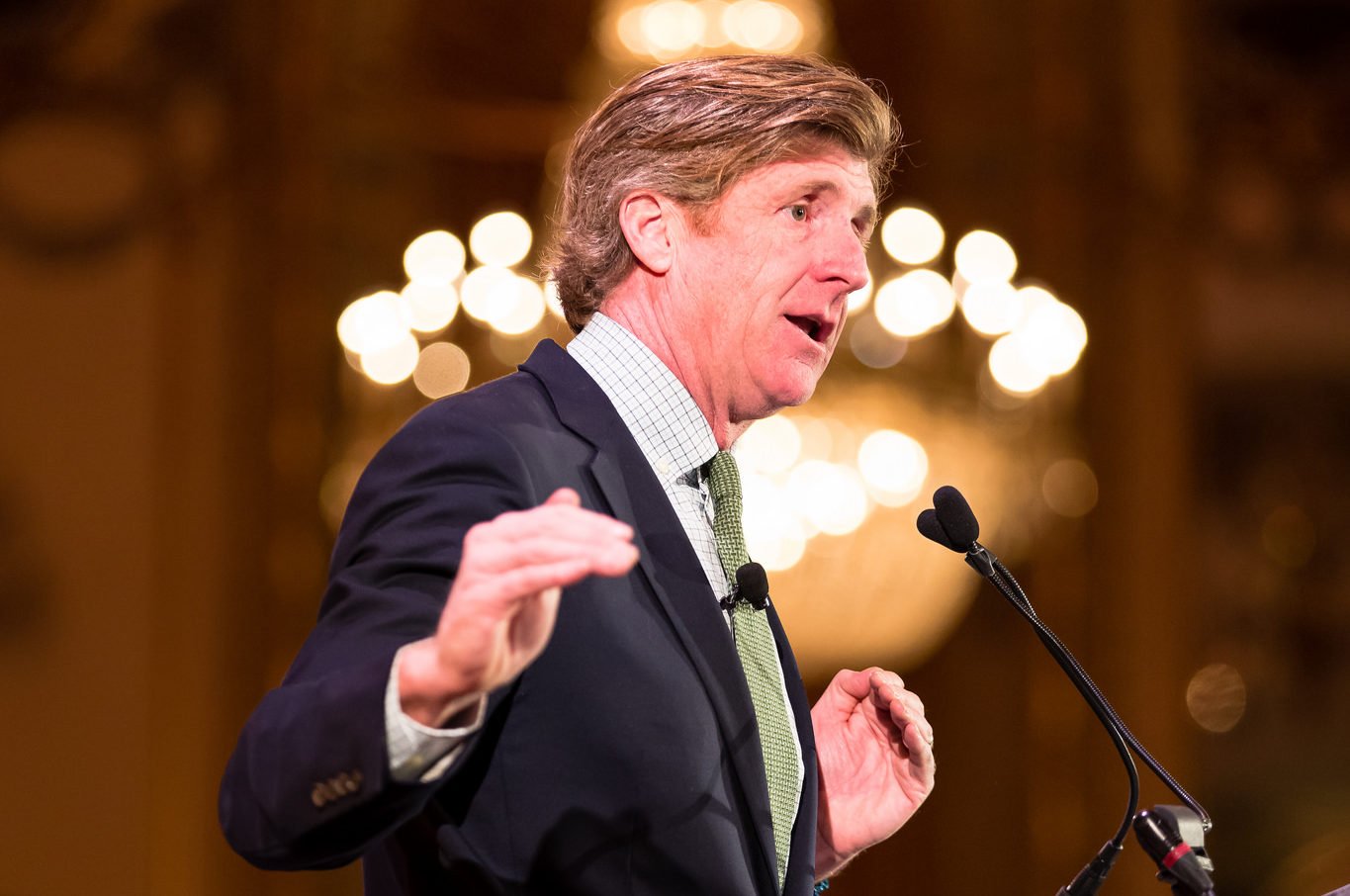As opioid addiction and homelessness plague American cities and towns, former congressman Patrick Kennedy (D-RI), a leading mental health and recovery advocate, is fighting back. Working with organizations like One Mind, which pushes for greater global investment in brain research, and Mental Health for US, a nonpartisan initiative designed to elevate mental health and addiction in policy conversations during the 2020 election cycle, Kennedy is determined to change how addiction and mental illness are perceived and treated, and to end what he calls insurance companies’ “terrorizing” of patients. He spoke to us about why he’s deeply opposed to legalizing marijuana, his choice for president in 2020 and why we’re doomed to failure if the medical and justice systems don’t find ways to work together.
Q: What are the misconceptions you’d like to dispel about depression and mental health?
A: The bottom line is that we still have a huge stigma, so that we look at these issues as moral failings, not medical issues.
You were the lead author of 2008’s Mental Health Parity and Addiction Equity Act. How would you assess its success in the past decade?
It was very fortuitous that it was passed in 2008, because in 2010 we passed the Affordable Care Act which included mental health addiction services as essential benefits, and this was a breakthrough for our movement. Mental health and addiction have always been marginalized. Part of our effort for parity is to be sure it’s reimbursed the same as every other chronic illness. Much of the money that comes for mental health and addiction treatment comes through grants. What advocates in addiction and mental illness want is this to be part of the same reimbursement system, so we’re not relegated to a patchwork quilt of service delivery, dependent on the vagaries of how local and state governments spend their grant money.

What are the challenges to making it effective?
In every state there are huge disparities in access to care for alcoholism, addiction and schizophrenia compared to any other chronic illness like diabetes.
The challenge to achieving parity is holding insurers accountable. They deny care and terrorize people seeking treatment through things like requiring pre-authorization, concurrent review and retroactive review, where they’ll say, “We told you we were going to cover this but in hindsight it’s not covered.” The parity law hasn’t had the weight of federal enforcement and implementation. We haven’t gotten the degree of enforcement and implementation rigor that we would have expected and frankly that would have been expected for any other illness or condition. We’ve started ParityTrack.org, looking at an assessment of what states are doing and how they’re doing. In every state there are huge disparities in access to care for alcoholism, addiction and schizophrenia compared to any other chronic illness like diabetes.
Is part of the issue the lack of trained professionals addressing mental health and addiction?
If you paid mental health and addiction caregivers the same as for any other condition, you’d find that there were a lot more of them. Among Generations X, Y and Z, there’s a huge explosion in incidents and prevalence of depression and anxiety. The bottom line is there’s going to be an increasing need for these services by employers because their workforce is demanding it and grew up in an age where they weren’t as stigmatized by these illnesses. If employers want to attract and retain a talented workforce, they’re going to have to offer not only higher compensation, but benefits including access to mental healthcare. Employers have to insist that insurers give them a health plan that adequately treats these issues, or it will cut into their bottom line.
Let’s talk about the nexus of mental health and substance abuse, and how these issues play out in cities in terms of homelessness and addiction. What are the most important things to know and what kind of action do you think the government—and possibly private citizens—need to take?

I think we should look at a total package of services that is not delineated necessarily by the type of service, but rather by the outcome and goal being sought. If you want people to live independently with a good quality of life, which is defined differently by different people, you need an alternative reimbursement formula really focusing on what each individual needs. Ideally a service provider is responsible for everything: housing, recovery and employment. That’s a better model. You can have all the benefits [for psychological counseling and prescriptions] in the world, but if you don’t have transportation, or food on the table, none of the benefits will make a difference.
Are there any cities, either domestic or international, that are making progress in these areas?
Los Angeles County is contracting with providers to take on lists of individuals and they’ll help them live independently as much as possible, so they’re not living on the streets or languishing in the county jails or emergency rooms. These are things that we can measure toward now, but we need to have some kind of case management, full-service entity who will negotiate for supportive housing, adequate peer supports and vocational training. California’s wealth tax allows for there to be not only Medicaid expansion, but also an additional safety net for folks through the Mental Health Services Act.
Around the country, Certified Community Behavioral Health Centers (CCBHC) are a great model. They take insurance, a lot of which can take the form of an alternative payment system. The state Medicaid can contract with them to provide the necessary services to keep someone independent and thriving. Rather than counting off the therapy visits or the medication, they’re looking at the whole person and asking, “How can I keep them out of the emergency room and living independently?”
Vermont is providing services in a way that’s seen as a model nationally. It’s partnering small outposts that are on the front lines with logistical support through telemedicine, leveraging and making efficient the limited supply of practitioners, and helping coordinate available resources. In the future, it will all be telemedicine.
In Pawtucket, RI, we have Anchor Learning Academy, a recovery high school that’s part of a huge community built up around the Anchor Recovery Community Center. We’re finally getting attention for these issues, and finding these models is going to be important. As we see more money come into this space through big legal judgements from big pharma, those are going to provide a lot of dollars and hopefully we’ll see a lot more federal dollars.
What do you see as the role of insurance?
I want the insurance system to have the risk of paying for this. Once they have the risk, it will become crystal clear that in order to avoid the heavy costs that come from being obligated to pay for mental health, they will find solutions. Right now, they don’t have incentive to find solutions, because they’re not having to pay the full weight of the crisis. They can shift it on to other payers in the marketplace, usually to the government, and of course to families who often mortgage their homes to pay for care. We have to change the whole financial incentive system. If we do that, the marketplace will find new solutions.
Are there any leaders whose work is having a real impact?
Judge Steven Leifman of the Eleventh Judicial Circuit Court of Florida is a hero in our movement. He persuaded the Miami-Dade county commission, which has a Republican majority, that it was more cost effective for them to pay for supportive housing than to do anything else in the criminal justice system. Judge Leifman said people with mental illness were essentially clogging the criminal justice system with petty offenses, driven mostly by untreated mental illness. He convinced the county to pay for housing out of the criminal justice budget, giving stability to “frequent flyers”—the people with addiction and mental illness who constantly end up in the emergency rooms and county jail.
There’s a lot of money associated with arresting, adjudicating and incarcerating. It’s important to remember all of these are huge amounts of taxpayer dollars. Low and behold, they’ve reduced their jail population and total cost of their budget in terms of criminal justice system.
What should happen next?
If you take this to its logical conclusion, you’ve got 30 to 40 percent of the population who are really bad people and a danger to society, but if 60 percent to 70 percent are people who can be rehabilitated or kept from ending up there in the first place, that’s a huge game changer for our whole society.
The real game changer is if healthcare and criminal justice systems work in concert.
We haven’t aligned the financial incentives for our criminal justice system with the financial incentives for our medical system, but you’d have double bang for the buck. To underwrite the risk for both ERs and for jail, which are the lowest hanging fruit in this process, would make it possible to add resources for the community services. Some support can come from the healthcare system and insurers, and some from the criminal justice system, but you can’t put it on them to do the job of the other and make it financially viable. You have to bring them both in. The real game changer is if healthcare and criminal justice systems work in concert.
You wrote an op-ed last month about the questions you’re asking the 2020 Democratic presidential candidates. What questions do you wish moderators would ask in the next debate about mental healthcare?
I’d ask, “Are you willing to spend the same amount of money per life lost for mental health and addiction as you were willing to spend for AIDS life lost or cancer life lost?” For at least a decade, we spent $24 billion a year to tackle the death rate of 53,000 Americans from AIDS. We’re spending $6 billion now on a crisis that takes 130,000 lives. It’s staggering. We’re spending a fraction of what we spent on HIV/AIDS for a crisis that kills over twice as many people, when you add suicide to the overdose crisis.
Are you ready to endorse any of the candidates?
I love Joe Biden, and he’s been a friend of my family since I was a child. I’m very impressed with many of the other candidates who are running. They’re smart and have good ideas, but people vote for someone who has all of those and who they like. Joe’s someone they like. He knows this issue intimately, in terms of what he’s gone through with his family and suffering with Hunter. Addiction is an illness that’s touched his life in pretty dramatic ways. He’s also the only candidate who has not rushed to support legalization of marijuana, which I think will be the next Purdue Pharma and big tobacco, and we will regret the day we ever went down this road. Biden gets that better than any of the candidates.
Many politicians say they want to decriminalize marijuana because our justice system punishes marijuana use and sale by people of color at vastly disproportionate rates.
That’s conflating our disastrous war on drugs with the commercialization of a product that’s not been good for mental health, to put it mildly. Tackle racial bias, don’t commercialize the drug. If minorities are getting arrested at four times the rate, do better training in bias awareness. That’s the way to solve this, not to give a multi-billion dollar industry the green light to market addictive substances principally to young people, in just the same way liquor has been marketed.
I’m working with an organization called Smart Approaches to Marijuana, and we worked with New Jersey Legislative Black Caucus to stop marijuana legalization in New Jersey. We lead the effort to stop commercialization. There are eight times as many liquor stores in minority communities as in white ones. The same will happen with pot if it’s legal.
Why did you cofound the brain research organization One Mind, and what do you hope it will achieve?
Neuroscience is the single most important investment we can make as a nation. If we don’t get it right, Alzheimer’s will swallow our healthcare system in terms of cost and personal impact. Outside of that, autism is enormous, Parkinson’s, ALS, you can go down the list, and that’s not including anxiety, panic, depression and addiction. This is an existential crisis for our country: We need to mitigate the symptoms of these illnesses.
We have convened the smartest neuroscientists in the world. Our goal is to take the kinds of personalized medicine approaches to neurological diseases that we currently have for cancers.
How would we pay for this?
We tackle financing for it by putting together the best thinkers to talk about financing it with savings bonds, which we did in World War II. We need to do the same with this. If we invest in identifying and delaying the onset of full-blown Alzheimer’s and Parkinson’s, even just by months, we save ourselves hundreds of billions to trillions of dollars that we would otherwise spend if we did nothing.
You’ve called for educators and schools to learn more about helping young people with depression. What are concrete steps all adults can take to help young people?
We need to start with pediatricians and make sure mental health maintenance runs all the way through the life cycle, that baselines are tracked like blood pressure and cholesterol, and that physicians take a family history of mental illness, just as they do with cardiovascular and other diseases.
Educationally, we should train all teachers on social-emotional learning and teach kids problem solving and coping mechanisms for stress. These are the most important skills we can teach kids and we’re not doing it, which is shocking.
What do you hope—and think is realistic—to achieve in the next five years?
I hope we achieve a moment of clarity. If we have a moment of clarity as a nation, if we have that kind of wake-up call about this existential threat, everything else will take care of itself. We can’t ask the right questions unless we come to the realization that this is something to which we must devote our full attention. If we do all that, my hope would be we spend as much on this health crisis as we spent on AIDS, to dramatically change the death and disability rate of these illnesses.
How much of this funding is dependent on who’s in power politically?
I’d say almost entirely. I’m leading a bipartisan effort, Mental Health for US, with former senator Gordon Smith (R-Ore.). There wouldn’t be as much difference if you had a president like Chris Christie, Gordon Smith or even Newt Gingrich, who joined Democrats and doubled the NIH budget. There is a lot of bipartisanship, but there’s also a massive challenge getting the Republican Party to see this as an investment with a huge ROI, rather than defining it as a cost because it involves people who are easy to write off and easy to define in negative terms. I really care about the mental health crisis, but we can’t solve any of our problems unless we solve the problems of our democracy.






